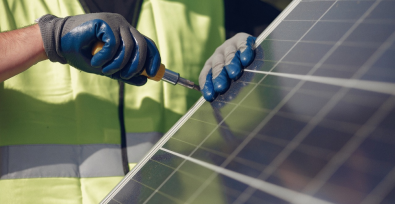The U.S. Department of Labor recently released a report providing a list of goods produced using either child labor or forced labor. Some of the goods on the list are key components in climate-friendly technology, raising ethical issues for the U.S. government and consumers reports The Hill.
Green energy with dubious ethics
Climate change and its effects on our planet are global issues. Many of the world’s most vulnerable people are living with the negative impact of those effects leading to issues like forced migration and loss of livelihood. But findings in the report raise tough questions about the connection between climate-friendly technology and to what extent its production is connected to forced labor and forced child labor.
The U.S. doesn’t directly import the minerals in question. But items that contain these minerals, like electric vehicles and solar panels, are imported, mostly from China. That means items with forced labor in their supply chain are likely making their way from countries where the minerals are mined, to countries where they are processed. Those tainted items then get used in manufacturing, and from there make their way into U.S. markets.
Abigail Hunter, executive director of the Center for Critical Minerals Strategy at energy security think tank SAFE, said:
“…we are importing embedded material which is almost always going through China for further transformation (so that means) we have less leverage over how the material is extracted, including if it is extracted with forced, child, or forced child labor.”
This issue puts the U.S. government and consumers in a major ethical quandary around the clean energy transition. Clearly climate change must be addressed. But we cannot just ignore serious modern slavery concerns about the new technology being used to address it.
Scrubbing out the stain
The report found that forced labor is often involved in the extraction of Chinese aluminum and cobalt from Congo. In addition, exploitative child labor is often involved in mining minerals in Congo, Zambia and Zimbabwe. Trying to trace the minerals through the entire supply chain is difficult. After minerals are mined, they need to be refined for use in energy technologies. Most refinement happens in China whose track record with forced labor is well documented as one of the world’s worst.
Gracelin Baskaran, director of the Project on Critical Minerals Security at the Center for Strategic and International Studies said:
“Once that cobalt goes into … a refining phase you can’t differentiate where it came from.”
According to sectoral experts, the clean energy sector is investing heavily in supply chain tracing tools. That includes supply chain audits and commitments to the industry’s efforts to avoid buying materials made with forced labor. And looking beyond supply-chain mapping, another idea is a tax on minerals extracted with child and slave labor.
Greg Wischer, founder of consulting firm Dei Gratia Minerals said:
“If [a] material is going to be produced in a manner that violates labor and safety standards, that material should be …. tariffed at a higher rate,”
Baskaran noted many of the African countries hit with droughts due to climate change are the same ones having labor issues. The demand for the products that contain the problematic components seems only poised to go up.
Baskaran stated:
“We can’t not go through the transition, because that’s also going to cost millions of lives,”
The best approach is to try to curb the use of unethical labor practices by participating in the green energy transition while continuing to improve supply-chain mapping practices. Both climate change and modern slavery need to be addressed in parallel, because a healthy environment should never come at the cost of someone’s freedom.







Freedom United is interested in hearing from our community and welcomes relevant, informed comments, advice, and insights that advance the conversation around our campaigns and advocacy. We value inclusivity and respect within our community. To be approved, your comments should be civil.
There is a good reason for child labor laws, think about it people, money isn’t everything!
Without reverting to palaeolithic-style living, we need to vastly reduce the complexity of our lives and what we consider essential to them, don’t we? Many of the commodities we consider essential today, we lived without perfectly successfully for thousands of years. We could again. Indeed, we may have to; so better to control the process than fall into it by ghastly accident.